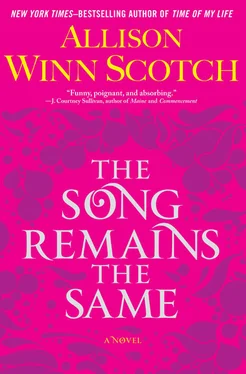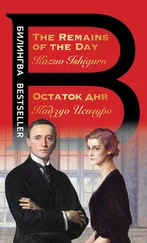My eyes do feel heavy, so I let him go with the promise that he’ll come back tomorrow. The nurse returns to wheel him back to his own recovery, but not before he places the People magazine next to me, next to the photo album filled with disparate faces of strangers, and I’m left to wonder, just before I slip into slumber, how my life can be so well documented when I can’t recall one single second, one tiny sliver of an iota of the life that came before.
By my fourth day of consciousness and a week and a half since my plane split in two, I have submitted myself to every test possible—the MRI, the CAT scan, the interviews with the hospital shrink, an oxygen test, an I’m-not-sure-what-the-hell-that-was-for test, the how-many-presidents-can-you-name test (zero, but Peter kindly reminded the psychologist that I’d never been one for history), and we are no closer to assessing the cause behind my memory loss.
Physically, I am also an anomaly, an equation with no solution. The neck brace came off today, and my left wrist is fractured and splinted, and a few of my upper ribs are bruised, such that a sharp jolt of pain greets me when I try to shift too quickly, but for the most part—the welts on my face and the scabs from the surface wounds aside—I am remarkably in one piece. Other than my brain, of course. Other than that, I’m nearly perfect.
My mother has placed crystals by my bed— healing crystals, she says, as if she is wiser than the men armed with their degrees in modern medicine—and she has paraded an endless slide show of pictures in front of me. Still, nothing from my thirty-two years of experience has returned to my cerebral landscape. I ask about my father— where is he? —and am told only that we lost him when I was a teenager. That he was once a famous painter but now he is gone. My mom hushes me and says that she’ll explain it all when I’m stronger, when I’m ready.
Samantha, my slightly anorexic—but not in a diagnosable way—college roommate whose brown roots have been left untouched too long and whose cheeks are in much need of a blush brush, arrived yesterday: I recognize her only from the photos, of her standing beside me at my wedding, and of us in sorority T-shirts after two too many shots of god knows what, grinning ridiculous grins as if our whole lives were in front of us. Invincible. That’s how we looked. Untouchable. She sits beside me and tries not to cry but, like everyone else—Peter, my mom—mostly fails at the task, and so sniffles and gasps while trying to offer me a shoulder on which to lean.
My younger sister, Rory, who comes from a seemingly entirely different gene pool—with luminescent red hair, six extra inches, and eyes the color of ripe moss, shuffles in after Samantha. She is pretty in a way that makes my pupils pop, an immaculate blend of DNA that unites every once in a while to create something exquisite. She forces a smile and says that we run the art gallery together, and I forge a real smile back, at the idea of our fabulous selves tackling the world together, ascending the heights of New York City: the two of us, sisters. Strangers now, but sisters once. I bask in the idea of this, even without knowing her. Once I knew her. Once, way back when, when I had a life, and I’m comforted in the idea that we had a life together.
“It was my fault you went,” she says, pulling me from the moment. Her face muscles quiver like they’re too exhausted to function properly, and I can see her consciously trying to tame them, to abate the torrent of tears that will be inevitable. Her guilt clouds her perfect green eyes, darkening the glow of her obviously flawless skin. “I normally do the artist meetings, but Hugh had tickets to Springsteen before the holiday weekend, so I made you go.” Hugh, she explains in a sidebar, is her boyfriend of two years, and is back at their hotel. He flew out here with her for support—at least until he has to be back at work on Monday. She confides that this is a precursor to their engagement. But then she catches herself, as if there’s a rule against thinking happy thoughts in my company.
“It’s no one’s fault,” I answer, though maybe it actually is. Maybe it is her fault, and I have a million reasons to be furious with her. Who knows? Not me.
Samantha stops in two nights in a row before pushing back to Hoboken, back to her eighty-hour-a-week job as a big-firm lawyer, and back to her husband and his hundred-hour-a-week job at an investment bank. “Sometimes, I wish we could just be twenty-one again,” she says as she lays an old sorority shirt over my torso and snaps a picture with her iPhone, thrusting it close to me. The shirt reads GOLF NIGHT, and Sam explains that this was a mixer in which we went to our favorite fraternity and imbibed a different drink in each room.
“Like, a hole, a golf hole,” she says. “You were always the most levelheaded, stayed the most sober, but still it was our favorite party of the year. We always tried to get you to do a drink in every room, but you held your ground: too mature for us even at twenty-one.” She laughs, and even though I know she means this as a compliment, mostly it breaks my heart. I stare around at the hospital room and the gravity that life can bring and wonder why anyone would ever want to grow up too soon, take it all too seriously.
“How did we meet?” I say, suspecting I can get it right: that we stumbled into each other at an underground off-campus party, or that I was so dazzling in an art history seminar that she couldn’t help but introduce herself, or that I was strolling around the campus and simply had it, the magnetic it that everyone was drawn to. But even before she tells me, even before I’m done telling myself these things, I know this can’t be true. That the face on the cover of People, with the frown, with its matching commas that cratered into my chin, well, she wasn’t it. She may not have even know what it was in the first place.
“Oh, funny story,” Sam says. “We met the first week at school. In the breakfast line. Neither of us knew anyone else to sit with, and since we both reached for the Frosted Flakes vat, we chose each other.”
“Not exactly something to write home about.”
“No,” she laughs. “But we milked ‘ they’re great ’ for the longest time after that.” I look at her blankly, and she tries to smile. “Inside joke. Tony the Tiger. Better told another time.”
Dutifully, every morning during this first week, Peter has come by to refill the vase on the windowsill with daisies.
“They’re your favorite,” he said the first time he arrived with a bouquet.
“Really?” I answered, because it seemed hard to believe that daisies could be anyone’s favorite.
“Well,” he conceded. “They weren’t, but I gave them to you on our first date, and then they sort of became our thing. Like, shouldn’t I have known better? ” He laughed but it sounded more like a hiccup. “I probably should have known that you’d want something elegant, perfect, long-lasting. But you know, you being you, you just told me you loved them—didn’t want to be rude to this imbecile who showed up with cheap flowers, and didn’t tell me otherwise until a year later when you actually decided that you did love them.” He shrugged. “They were the only flower I could afford when we first met.”
“So what were my favorites? My real favorites?” I asked. I pictured it, or tried to anyway. Him: half a decade younger, without the pallor of grief on his face, wooing me with daisies. Me: also half a decade younger, no awareness of what life would bring, liking him enough to allow him to woo me with said daisies. I smiled. It was cute, almost, if you didn’t know what happens next. But even then, I reconsidered—it was still cute. His ineptitude with the flowers, and that I didn’t want to embarrass him over this ineptitude. I must have really liked him, really been smitten. And now, even though he felt too tall for me, like I’d have to stand on my tippy tiptoes to kiss him, and too broad, too, like he might crush me if he rolled over on me one night while I was sleeping too heavily to notice, I softened in the re-created, subjective memory of it all.
Читать дальше












